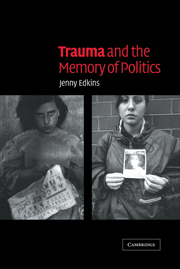Book contents
- Frontmatter
- Contents
- List of illustrations
- Preface
- 1 Introduction: trauma, violence and political community
- 2 Survivor memories and the diagnosis of trauma: the Great War and Vietnam
- 3 War memorials and remembrance: the London Cenotaph and the Vietnam Wall
- 4 Concentration camp memorials and museums: Dachau and the US Holocaust Memorial Museum
- 5 Testimony and sovereign power after Auschwitz: Holocaust witness and Kosovo refugees
- 6 Conclusion: the return of the political – the memory of politics
- Bibliography
- Index
6 - Conclusion: the return of the political – the memory of politics
Published online by Cambridge University Press: 05 October 2013
- Frontmatter
- Contents
- List of illustrations
- Preface
- 1 Introduction: trauma, violence and political community
- 2 Survivor memories and the diagnosis of trauma: the Great War and Vietnam
- 3 War memorials and remembrance: the London Cenotaph and the Vietnam Wall
- 4 Concentration camp memorials and museums: Dachau and the US Holocaust Memorial Museum
- 5 Testimony and sovereign power after Auschwitz: Holocaust witness and Kosovo refugees
- 6 Conclusion: the return of the political – the memory of politics
- Bibliography
- Index
Summary
Humans bear within themselves the mark of the inhuman … their spirit contains at its very centre the wound of the non-spirit.
– Giorgio AgambenBefore 11 September 2001 it seemed for many people living in North America and Europe that trauma was something distant in time and place. It was either something they knew about through their parents' or grandparents' war memories, or more distant folk memories of famines, wars or other upheavals, or something they might have come across through friends or relatives who had experienced private trauma of one sort or another – sexual or physical abuse within the family being perhaps the most common. Many people themselves would not have come closer to the sense of vulnerability and the fracturing of self that what we call trauma brings, than a war movie or a road traffic accident. In other parts of the world, of course, this was not the case. Wars, genocides, torture and persecutions formed part of the map of the second half of the twentieth century, as of the first, but they were exported for much of it to what was then called the Third World. And, of course, at the beginning of the twenty-first century not only were there older generations in Europe and North America with memories of when Europe was a far from peaceful continent.
- Type
- Chapter
- Information
- Trauma and the Memory of Politics , pp. 215 - 233Publisher: Cambridge University PressPrint publication year: 2003



